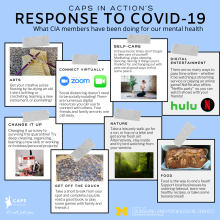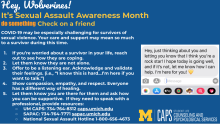We fully support all CDC guidelines around social distancing. At the same time, we know that for many students, particularly those who struggle with depression and loneliness, a recommendation to distance from others can take the form of increased social isolation. This isolating behavior can increase mental health symptoms. We encourage you to be aware of these possible concerns, continue to build relationships in new ways, and consult with us as needed.
Viewing Coverage Of COVID-19
Viewing media coverage of COVID-19 can bring a range of emotions. It can be important to be informed, but we have to be aware of how the coverage may be impacting us. Understand that this is a very unusual time in our life, so it's ok to have mixed emotions. Allow yourself to feel, whatever you are feeling. Give yourself a break, treat yourself with respect. Today may not have been my most productive day, but it's ok. I have already planned some goals for tomorrow and I will make it up tomorrow.
Xenophobic And Racist Biases
Although anti-Asian and Asian American xenophobia and racism is not a new phenomenon, we acknowledge that the COVID-19 pandemic has generated greater xenophobic and racist biases against both international and domestic people of Asian descent. Incidences of harassment, assault, and microaggressions against any members of our community must be faced head on. We encourage our UM community to check and challenge biases within ourselves and within our social networks. We can recognize the fear this illness generates, while also offering compassion to ourselves and others during this time.
How Students Are Coping (CIA Infographic)
Student leaders from CAPS In Action, a CAPS affiliated student group, came together to share ways they are taking care of their mental health during COVID-19.
COVID-19 Self-Checklist
How are you feeling? Anxious, worried, hopeful, bored, regretful, connected, sad, tired, at a loss, or low or no motivation? These are some of the common feelings that we have been hearing from students as they are struggling to adjust to this new and unknown circumstance of the stay-at-home order. The way we respond to a change or a trigger, such as COVID-19, is different for each individual, depending on many factors including our background, our support systems, and our biological make-up. Below is a list of possible reasons behind some feelings or emotions:
Sexual Assault and COVID-19
UM CAPS created a virtual guide (below) where you’ll find information about sexual assault and mental health, resources for supporting yourself or a friend, sexual violence and social identities, and strategies to practice self-care (even during a global pandemic).
Anxiety and COVID-19
Anxiety is a natural reaction for many people during the current COVID-19 pandemic. People may experience worries about health (for ourselves and others), the future, financial situations, academic and work responsibilities, discrimination, and relationships with others. It is natural for these worries to arise in response to uncertainty. People may also experience racing thoughts, restlessness, fatigue, insomnia, irritability, increased heart rate, breathing problems, and/or nausea as part of feeling anxious that can be overwhelming and interfere with our daily life.
Autism Spectrum and COVID-19
During COVID-19 we are all facing a great deal of uncertainty and change. For many in the Autism community, disruptions caused by the pandemic may be particularly challenging. Students on the Autism Spectrum may be unnerved by changes in daily routine and environment, including adjustment to remote learning, and some may experience difficulty accessing needed services and accommodations. Additionally, those on the Autism Spectrum may be managing new social challenges as they learn new ways of interacting and communicating.
How to Cope After Learning Someone You Care About Tested Positive for COVID-19
If you are reading this page, it is likely that you know someone that has tested positive for COVID-19 or is suspected to have it. Prior to this moment, along with feeling shocked and fearful as you saw the number of COVID-19 cases increase throughout the country and the world, there may have also been some comfort and security knowing that those you cared most about were safe.
Coping with Uncertainty
While life is often fraught with uncertainty, as we cannot predict the future, constructing a framework to draw from, helps us in having a grounded idea of what our next steps might look like. In the early months of 2020, our collective sense of certainty dissolved in what felt like a moment’s notice. The COVID-19 pandemic created a lot of change that is sudden and quickly evolving, leading to a perpetual state of uncertainty for many.










